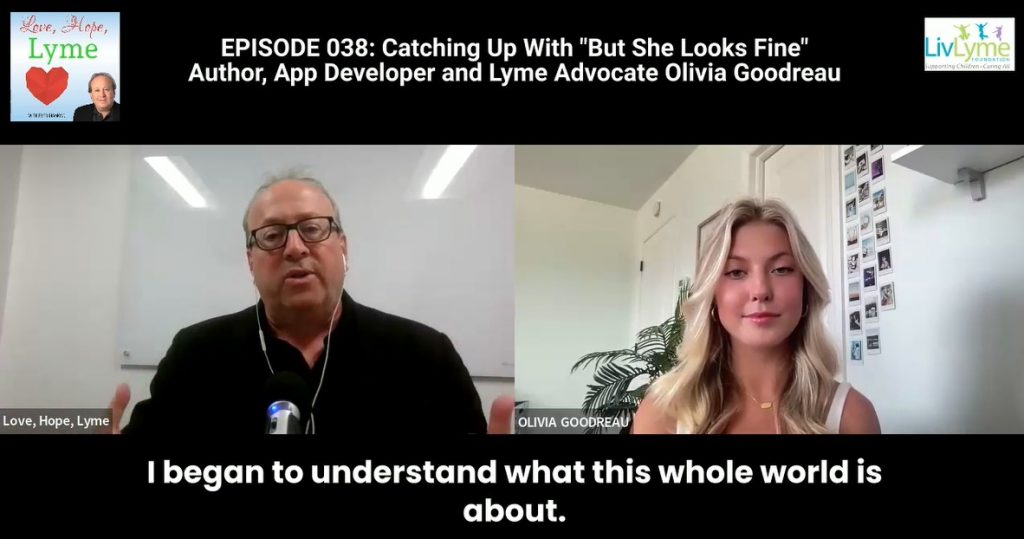PODCAST: Catching up with Lyme advocate Olivia Goodreau

By Fred Diamond
When I was writing my book “Love, Hope, Lyme: What Family Members, Partners, and Friends Who Love a Chronic Lyme Survivor Need to Know,” I met many people who were remarkable advocates for Lyme disease awareness. I also was heartened to see how many of them came together to encourage others to lead.
On the latest episode of the Love, Hope, Lyme podcast, we get an update from LivLyme Foundation leader Olivia Goodreau.
She told stories about how Colonel Nicole Malachowski and Dr. Richard Horowitz gave her the confidence to be public about her Lyme advocacy. She also spoke about where her drive to serve comes from.
Resilience, determination, commitment to helping others
At just 12 years old, Olivia was thrust into a world few could imagine, grappling with the effects of Lyme disease. But she turned her challenges into a force for good, becoming a passionate advocate for others suffering from Lyme and other tick-borne diseases.
Olivia’s journey to advocacy didn’t happen overnight. It was shaped by her experiences, her family’s influence, and her drive to create change. Today, through her organization, the LivLyme Foundation, she continues to inspire hope while offering advice to those who want to follow a similar path.
Olivia attributes much of her advocacy work to her family’s longstanding involvement in nonprofit efforts.
“I come from a family that is so generous and incredible,” she says, recalling how her grandmother and parents were active in the nonprofit world. Even as a young girl, Olivia was immersed in this environment, helping with efforts like Dolls for Daughters, a nonprofit her family supported. “I’ve never not been exposed to things like that, which I think had a great impact on who I am today. Nonprofit work and being exposed to the art of giving and generosity is absolutely incredible.”
This early exposure not only familiarized Olivia with the inner workings of nonprofits but also normalized the concept of giving back. She knew what a nonprofit was and what it could achieve.
“For me, it was less intimidating. I had seen my parents and grandmother do that,” Olivia reflects. Armed with this knowledge, she felt empowered when she told her mother she wanted to start a nonprofit to help others struggling with Lyme disease. Her mother quickly became her “number one supporter,” fully embracing her daughter’s ambitious vision.
Stepping into advocacy
Olivia’s decision to start the LivLyme Foundation wasn’t just an impulsive idea—it stemmed from a personal frustration with the lack of progress in Lyme disease research and awareness. “I know there are tons of incredible nonprofits out there, but at the time, it felt pretty stagnant,” Olivia explained.
One of Olivia’s biggest influences in her advocacy work is Colonel Nicole Malachowski, the first female Thunderbird pilot and a Lyme activist herself. Nicole once told Olivia, “We are recruited by ticks,” a sentiment Olivia strongly believes. This phrase resonates deeply with her, as Lyme disease did not just affect her health—it reshaped her entire life’s mission.
Colonel Malachowski is widely recognized for her groundbreaking career as the first female pilot in the U.S. Air Force’s elite Thunderbirds demonstration team. Her story is one of extraordinary achievement, resilience, and determination. However, her career took a dramatic turn when she faced one of the most challenging battles of her life—her battle with Lyme disease.
As a high-achieving fighter pilot, Malachowski was accustomed to overcoming obstacles, but the impact of Lyme disease, which she contracted in 2012, was like nothing she had ever faced. The disease significantly affected her health, leading her to retire from active service in 2017. Despite this, she did not allow Lyme to define her or hinder her spirit. Instead, she turned her attention to advocacy, using her voice and her platform to raise awareness about Lyme disease and the broader spectrum of tick-borne illnesses. It certainly had an impact on Olivia.
A defining moment at age 12
Olivia’s path to becoming a public advocate had a defining moment when she was unexpectedly called to speak in front of hundreds of medical professionals. After her mother arranged for Olivia’s new Lyme specialist, Dr. Horowitz, to be driven to a conference, Olivia had the opportunity to meet him. As they prepared to attend the event, Olivia had no idea that she would soon be called upon to share her story publicly for the first time.
“I had just met Dr. Horowitz, and he’s on stage saying, ‘I’d like to introduce my newest friend, Olivia Goodreau, to the stage to tell her story,’” she recalls. “I was 12 years old, completely blindsided.”
Although terrified at first, Olivia embraced the opportunity, speaking openly about her battle with Lyme disease. This experience would prove invaluable as she continued her advocacy work, helping her realize the power of simply talking about her experiences. “The audience is there because they want to support you and listen to you,” she explains. “If they didn’t, they’d leave.”
The birth of the LivLyme Foundation
Following that speech, Olivia’s vision for the LivLyme Foundation came to life, though it started with a bold move. On the car ride home from the conference, she told Dr. Horowitz she was planning a gala and wanted him to be the keynote speaker. At that point, no gala had been organized, nor was the foundation even formalized. “I wasn’t having a gala… it wasn’t anything happening,” she laughs. “But once I said it, I set a deadline for myself and my mom.”
The gala did happen—on April 8th, the only date Dr. Horowitz was available—and it marked the start of what would become a thriving organization dedicated to raising awareness and funds for Lyme disease research and treatment. For Olivia, this was just the beginning.
Advice for aspiring advocates
Olivia is candid about the challenges of being a young advocate. Yet, her main advice to those looking to follow a similar path is surprisingly simple: just ask. “The worst thing that can happen is them saying no,” she says. This mindset has opened doors for Olivia, whether reaching out to Congress members, inviting influential figures to speak at her events, or forming partnerships. “I’ve asked everyone—senators, mayors, governors. Sometimes it works, and on the occasional time, it doesn’t. But that’s okay.”
Her persistence has paid off, leading to meaningful conversations with political leaders and collaboration with other advocates. For those intimidated by the idea of reaching out to powerful figures, Olivia’s message is clear: “Just ask. The worst they can say is no.”
Another piece of advice she offers is to remain authentic, especially when dealing with personal hardships like chronic illness. “Be yourself,” Olivia stresses.
Pretending to be okay when she wasn’t took a toll on her both physically and emotionally. Opening to others, whether it’s about health struggles or advocacy goals, not only helps others understand but also fosters deeper connections. “When you’re not yourself, it hurts.”
Expanding her reach: technology and advocacy
In addition to her foundation, Olivia’s contributions to the Lyme disease community extend to technological innovations. She developed TickTracker, an app designed to help people report and track tick sightings in real time. “We have data from the CDC, HHS, museums, public and private companies, scientists, and citizen scientists,” Olivia explains. The app has been a game-changer for Lyme research, even detecting the East Asian Longhorn tick before other organizations. Olivia’s work with TickTracker won recognition at The Opportunity Project, where it outperformed tech giants like IBM and Oracle.
Her most recent project, LongHaul Tracker, aims to bridge the gap between Lyme disease and long-COVID research. With this app, users can track their symptoms, share data with healthcare providers, and even participate in research studies.
A message of hope
Ultimately, Olivia’s journey from a sick child to a national advocate for Lyme disease has been driven by hope—a word she holds dear. “I wanted people to understand that things are possible if you have hope,” she says. Her story, and the story of many others like her, is proof that no matter your age or circumstances, you can make a difference.
As Olivia continues her work, she hopes her journey will inspire others to take action in their own communities. Whether it’s through advocating for a cause, starting a nonprofit, or simply offering support to someone in need, Olivia’s advice remains: “Talk about it. The worst thing you can do is not talk about it.”
Click here to listen to all episodes of the Love, Hope, Lyme Podcast or on YouTube.
Click here to read our review of Olivia’s book.
Fred Diamond is based in Fairfax, Virginia and can be contacted via Facebook. His popular book, “Love, Hope, Lyme: What Family Members, Partners, and Friends Who Love a Chronic Lyme Survivor Need to Know” is available on Amazon. The e-version of the book is always free to Lyme survivors. PM Fred on Facebook for your copy.





















We invite you to comment on our Facebook page.
Visit LymeDisease.org Facebook Page